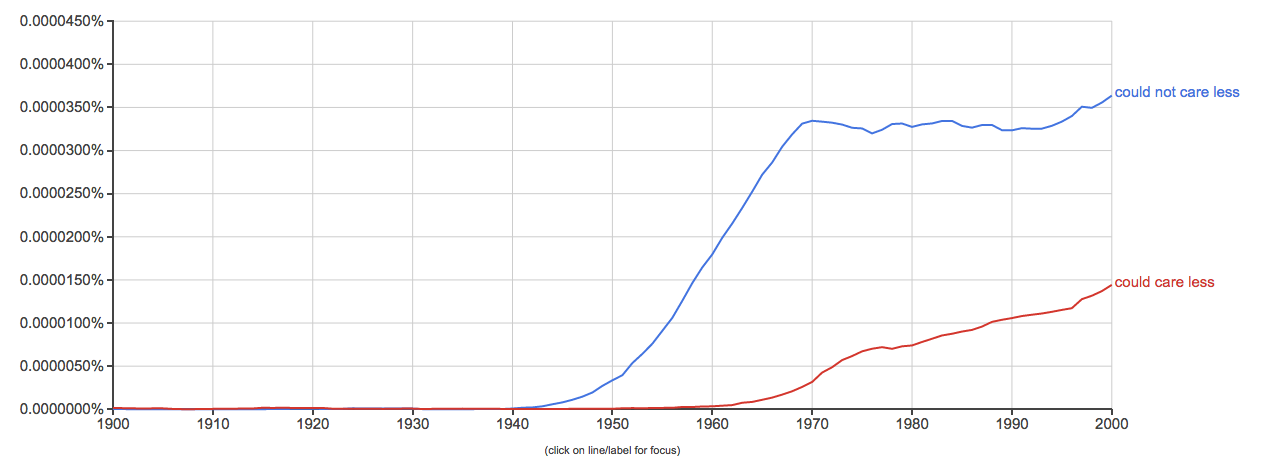Which one should you use? Are both forms acceptable? Do you have an ongoing dispute with someone about these sentences? If this is the case, you are not alone: this controversial topic has long provoked discord between language users and between linguists. I spent some time untangling this debate and eventually came up with an accurate picture of the matter.
Meaning and alternative forms
Let’s start off with the meaning. “I couldn’t care less” means: “I don’t care”, “I don’t give a damn” (informal), “I’m completely indifferent”, or “It doesn’t matter”. Even if “could care less” literally means the opposite, it has the same meaning of "couldn't care less" . In the way it is used, "could care less" can be regarded as an idiom: a pre-formed sentence whose meaning is not deducible from the individual words composing the idiom, but determined by its users. In fact, while “I could care less”, literally means that I care at least a little, it means that I don’t care. According to the Oxford English Dictionary, its use is common in North American informal English.
Origin
Both expressions originated quite recently. According to a commonly accepted version (that you would find in several blogs, forums threads, and even books), the usage of the phrase arose in the 1940s in the UK and started gaining popularity during the same decade. At some point, allegedly in the 1950s, it migrated to the US, where in a few years became very widespread. North Americans corrupted it in the form of “I could care less”, an improper sentence that would later spread around. Of course in this reconstruction, the Brits are the pure speakers who blame their North American cousins of corrupting their pristine language. Not surprisingly, the story is much more entangled.
In 2009, Ben Zimmer (B. Zimmer, Do We Care Less About "Could Care Less"?, October 6, 2009), a renowned American linguist and lexicographer, traced the first appearance of “couldn’t care less” to 1944 and in the US:
"I couldn't care less, darling," said Frederica who, being on duty in the ward, could not go to the party.
C. Brand, Danger List, Chicago Tribune, May 15, 1944, p. 18
While the first written appearance in the UK dates two years later, the English air transport pilot Anthony Phelps, titled his book I Couldn’t Care Less (1946).
If the original form of the sentence was probably “couldn’t care less”, the first known usage of "could care less" isn’t much more recent. The same Ben Zimmer identified it in a Washington Post dating 1955.
"The National League clubs have always shied from pitching left-handers against the Dodgers, but Casey Stengel could care less about the Dodgers' reputation for beating southpaws."
—"This Morning . . . With Shirley Povich," Washington Post, Sep. 25, 1955, p. C1
A few years later the debate popped up for the first time on Oct. 20, 1960, in the Lawrence Daily Journal-World. As you can read from the excerpt below, a reader was asking to the journalist Ann Landers, to solve a linguistic dispute among him and his girlfriend.

Ann Landers clearly leaned toward the “couldn’t” form. “To be honest,” she remarks sarcastically, “this is a waste of valuable newspaper space and I couldn’t care less.”
In 1979 William Safire, an American prominent language writer, summarized his views on the debate in his column on the New York Times.
The phrase popped up first about 1960, appeared in a letter to columnist Ann Landers in 1966 and in a few years began to cause concern as a barbaric attack on meaning. Acheson Hench, in a 1973 article in American Speech magazine, claimed it was a slurred form of “couldn't” resulting from two adjacent dental stops: “dnt.” Five years later, linguist James McMillan argued that in familiar sayings “less than the whole may effectively carry the semantic burden (hence such shortenings as syncope, clipping and nicknaming).”
Usage seems to have peaked in 1973, when The Wall Street Journal headlined: “More and More Girls Flip for Gymnastics; Boys Could Care Less.” A healthy derision set in; Herman Wouk called the inversion of meaning “a breezy vulgarism without tang” in the Harper Dictionary of Contemporary Usage, which called it “an ignorant debasement of the language.” Maybe the attacks on the antimeaning helped; eventually, like most vogue phrases, it wore out its welcome.
Farewell, “could care less"! You symbolized the exaltation of slovenliness, the demeaning of meaning, and were used by those who couldn't care less about confusing those who care about the use of words to make sense.
W. Safire, On Language, The New York Times, Sept. 30, 1979
William Safire’s obituary for “could care less” was definitely premature: “could care less” is still alive, while William Safire himself has passed away in 2009. Ironically “could care less”, far from petering out, is gaining popularity.
Take a look at the two graphs below that I produced with Google Ngram Viewer. The first one compares the rise in popularity of “couldn’t care less” against “could care less” in British English books. The second graph is for American English. It is true that the “could care less” form is more frequently used in American English and with a growing frequency, but the Brits are clearly wrong when they blame the Americans for having corrupted their language, because they use it too. Take into account that Google Ngram Viewer takes into account only books so that the frequencies could be different in spoken English.

Fig. 1. The frequency of “could not care less” vs “could care less” in British English books (1900-2008). Source: Google Ngram Viewer.

Fig 2. The frequency of “could not care less” vs “could care less” in American English books (1900-2008). Source: Google Ngram Viewer.
Some uncredited bloggers that I found while googling on the web, suggest that “could care less” might have originated as a colorful mock-question “I could care less?” in New York's Jewish community that later became mainstream.
Ludwig’s wrap up
- Everyone recognizes “couldn’t care less” as the correct one.
- Not everyone considers the “could care less” as acceptable —even if it is spread both spoken English and used in the New York Times and other major medias by prominent journalists (as in the examples on Ludwig).
I’ll pick the easy bet and stick with the universally accepted form and I couldn’t care less.






